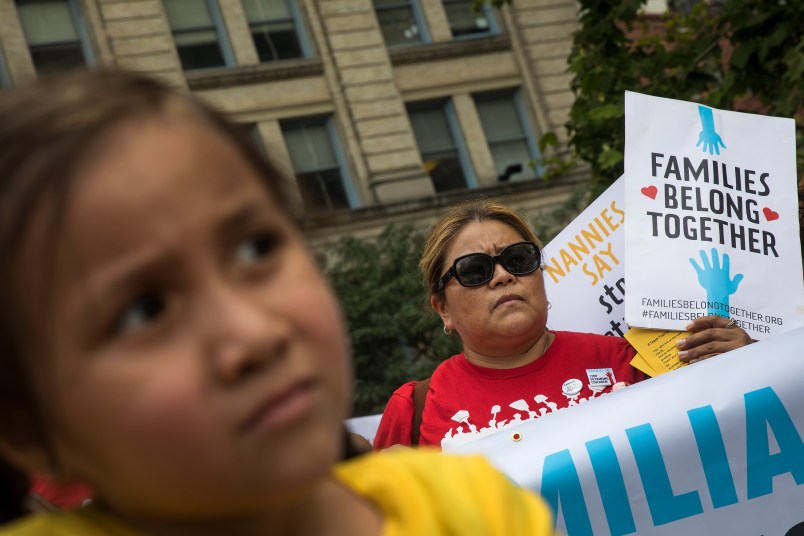With the deadline for reuniting thousands of separated immigrant families less than a week away, the the Trump administration revealed in a federal court filing late Thursday night that it plans to reunite just about 60 percent of the children between ages 5-17 that are in its custody. The rest — just over 900 — have been labeled ‘ineligible’ for reunification, because the parent either has a criminal record, is undergoing ‘further evaluation,’ or waived their right to be reunified.
Just 364 families with children older than 5 years old, out of a total of 2551, have been reunited so far, though 848 parents have been cleared for reunification, and 272 are likely to be cleared after they are interviewed by ICE.
Of those the government is deeming ineligible, it claims two must serve sentences before they can be transferred to ICE, 91 have a “prohibitive criminal record,” 136 waived reunification, and 679 will be subjected to further evaluation.
In the administration’s filing, the number of children it has deemed eligible for reunification and the number deemed ineligible do not add up to the total number of children identified in the class — falling 37 short. The Department of Health and Human Services, the agency overseeing the children’s detention and reunification, did not respond to TPM’s inquiry about the discrepancy.
On Monday, an HHS official took the witness stand and revealed under questioning that the administration has not been able to identify the parents of 71 children. There is no reference to that group in Thursday’s filing. The filing also contained no information about parents who have already been deported without their children. The administration promised to provide that data to the court and the ACLU sometime on Friday, including the date of the deportation, the parents’ home country, and the last place they were detained in the United States.
In the same joint status report, the American Civil Liberties Union complained that the government has refused to give them the information it needs to contact parents and inform them of their legal rights. In particular, the attorneys say they are concerned about the roughly 700 parents in the class who have a final order of removal, and may be swiftly deported just after they are reunified.
“These parents may only have a matter of days to make the momentous decision whether to leave their child behind in the United States,” the ACLU writes. “Plaintiffs have accordingly made urgent requests to Defendants for these parents’ information.”
The ACLU is also continue to ask for information about the families with children under 5 that the Trump administration failed to reunite before the July 10 deadline set by Judge Dana Sabraw at the U.S. District Court in San Diego. Specifically, they are asking the court to require the administration to show proof by July 23 that the parents deemed ineligible to get their children back have criminal records serious enough to merit the indefinite separation. The administration previously labeled some parents ineligible because of a low-level non-violent criminal record or an arrest warrant that never led to a conviction.
“Defendants must provide detailed and specific information as to why each putative Class Member with children under 5 was excluded based on criminal history, allegations of abuse or neglect, or parentage, given the age of these children,” the ACLU writes. “This information must be sufficiently detailed to allow Plaintiffs to dispute or challenge the reasons for excluding the parent from the class.”
The ACLU and the Trump administration will be back in Judge Sabraw’s court Friday afternoon.
Read the Trump administration’s status report here:











So they have placed that 1/3 with “fosters”. Additionally they have no plans to retrieve the servants/slaves from those “fine white” people.
I really hope the judge comes down hard and puts Azar and other top people in jail for contempt until there is full compliance.
The most charitable explanation of “needs further evaluation” is “we haven’t done the work that we are mandated by law to do”. The absolute most charitable.
Return the kidnapped children. Where are the children? Any waived rights by parents need to be investigated because I bet you there was blackmail involved in any agreements signed or people could have signed their rights away without knowing what they were signing.
Those 37 case about which no data was given. Are those the ones we’re something terrible has happened?